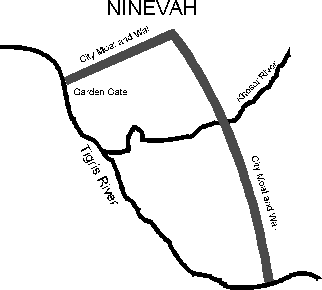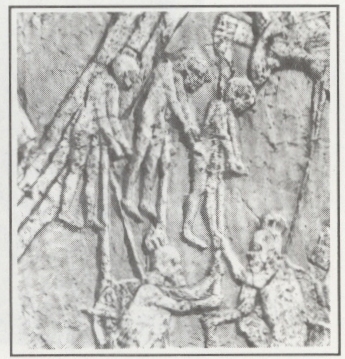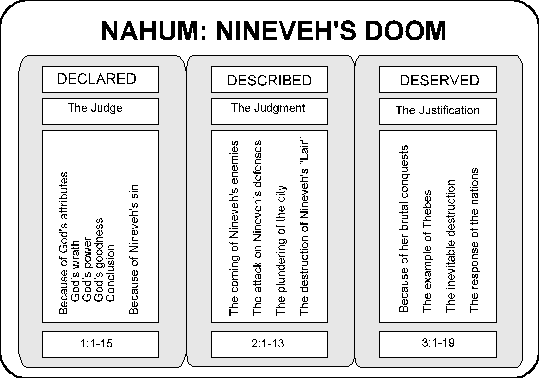7. Nahum
Introduction
The Author
The name “Nahum“ means comfort or consolation. His book is a message of destruction for Nineveh, and that would have been a message of consolation for the nations she had oppressed. The only thing we know about Nahum is found in 1:1 which says he was from Elkosh. But we don't know where that was because it is not mentioned elsewhere in the Bible. Some think it is the town of Capernaum near Galilee because Capernaum in Hebrew is <Whn~ rp*K* which means village of Nahum. Perhaps in honor of the prophet Nahum they changed the name of the city from Elkosh to Capernaum. This sort of thing happens today. Take Machunk Pennsylvania for example. There was a famous athlete who went to the Olympics from that town and they changed the name of the town in honor of him. Who was that athlete? Does anybody know? Machunk was changed to Jim Thorpe, Penn. It is possible that Elkosh was changed to Capernaum, but we can't know for sure. Nahum would have been much more popular than most prophets because he was preaching against the Assyrians and not Judah. So they might have changed the name. It's not something I would split a church over. It is also entirely possible that Elkosh was located somewhere else in Judah.
Date
It is difficult to determine a specific date for Nahum's ministry, but we can assume that it was written before 612 BC because that is when Nineveh was destroyed and since Nahum is predicting the destruction of Nineveh that would be a safe assumption. (Unless of course you are a liberal critic and deny the existence of predictive prophecy.) We can also assume that it was written after 663 B.C. because Nahum compares the destruction of Nineveh with the destruction of No-amon or Thebes in Egypt which was destroyed in 663 B.C. Thus Nahum probably wrote between 663 and 612 B.C.
If you remember, Jonah prophesied to Nineveh about 150 years earlier. It is interesting to compare Jonah's prophesy with Nahum's. I would take the following comparisons with a grain of salt, but there are some interesting things to note:
|
Jonah: The Mercy of God |
Nahum: The Judgment of God |
|
800 B.C. |
650 B.C. |
|
Emphasis on the prophet - only one prophecy in the whole book |
Emphasis on the prophecy - the only thing we know about the prophet is that he was from Elkosh. |
|
Disobedient prophet |
Obedient prophet |
|
Obedient Nation |
Disobedient Nation - in only 150 years the nation became so bad that it had to be destroyed. Does that remind you of America in any way? We've degenerated a lot in the last 50 years. |
|
Deliverance from Water |
Destruction by water ? |
|
Repentence of Nineveh |
Rebellion of Nineveh |
Historical Background
Nineveh was founded by Nimrod (Gen. 10:8-12) and had a long history. It was located on the east bank of the Tigris river. The river acted as the western and southern boundaries of the city. A wall that extended for eight miles formed the northern and eastern boundaries. The city was about three miles wide and eight miles long inside the walls, but there were suburbs that extended 14 miles north and 20 miles south. When Jonah referred to a three day walk across Nineveh (Jonah 3:3) it was no exaggeration.

The city was destroyed by the Babylonians, Medes and Scythians in 612 BC. According to the ancient historian, Diodorus Siculus, the armies laid siege to the city for over two years. In the third year, the Khosr River, which ran through the city flooded, broke down the floodgates and part of the wall which allowed the enemy to come in. This fulfilled part of Nahum's prophesy in 1:8; 2:6 and 3:13. (Diodorus Siculus tended to exaggerate - the Babylonian chronicles say the siege lasted only a few months. The truth is probably somewhere in between. But I think we can rely on the account of the flood because Nahum predicted it.)
The city was destroyed so completely by the flood and the enemies that when Alexander the Great fought the battle of Arbela nearby in 331 BC, he did not know there had been a city there. Nineveh was never rebuilt, and this confirms Nahum's prediction in 1:9 that “distress will not rise up twice.“ It wasn't until 1850 that Nineveh was discovered by archaeologists. It is interesting to read liberal commentaries from before 1850 because they had problems with believing the books of Jonah and Nahum because there was no record of Nineveh.
Nineveh was the capitol of Assyria. The destruction of Nineveh and Assyria would be a message of consolation for the nations Assyria had oppressed. Israel and Judah were two of those nations. Israel had been destroyed in 722 BC by the Assyrians, but Judah was still around. We need to remember what the Assyrians were like. They burned cities, cut off heads and stuck people on poles. We talk about taking a head count, the Assyrians really did it.

Assyrian relief of people on poles

I. Nineveh's Doom Declared--The Who
(1:2-15)
A. Because of God's Attributes (1:2-8)
1. God's wrath (1:2-3a)
God is a God of justice and when there is injustice, it makes Him angry. Luckily, He is slow to anger and patient.
2. God's power (1:3b-6)
God's vengeance (justice) and omnipotence are stressed by the complete devastation that is coming. His power is demonstrated by tornadoes and hurricanes and earthquakes. He can dry up the sea, wither the vegetation, and destroy everything on the earth. God has the power to do whatever He wants. No one can stand in His way.
What we don't realize is that in the ANE battle accounts and Assyrian records, the kings often described their battles with similar words. For example: Ashur-nasir-apli II claimed that at his approach “all lands convulse, writhe, and melt as though in a furnace.“1 So, this description of God's approach would have had special significance to the listeners of that day.
3. God's goodness (1:7)
But his wrath and power are tempered by His goodness. God is also aware of those who trust in Him and will preserve them (1:7). This should be a comfort to us when we see society disintegrating around us. Even though everyone else is bad, if we remain faithful, God will notice us and reward us - either by protecting us here on earth or rewarding us in heaven. We often feel like it has to be now, but eternal rewards really are better.
4. Conclusion (1:8)
For Ninevah the result is destruction because the people of Nineveh are evil. Notice the reference to the overwhelming flood. That was fulfilled by the flooding of the Khoser River and the flooding in of the enemies.
Notice that Nahum starts with God. Judgment comes because of who God is. When you get the character of God in mind, everything else falls into perspective. Having done that, Nahum now focuses on Nineveh.
B. Because of Ninevah's Sin (1:9-15)
Nineveh made war on God's people, and therefore, made war against God 1:9-11.
1:11 - From you, O Nineveh, one came forth that plotted against the Lord.
1:12 - Though I have afflicted you, O Judah, I will afflict you no longer. God was going to remove the oppression that Assyria had placed on His people.
In 1:11-15. Nahum alternates between the destruction of Nineveh and the restoration of Judah to show a contrast. The one who was on top will be brought down. The one who is on bottom will be restored. This is the way God always operates. The Last will be First and the First will be Last. God humbles those who exalt themselves and exalts those who humble themselves.
Assyria was God’s instrument for destroying the northern kingdom of Israel, but it went to their heads and they attributed success to their own power.
II. Nineveh's Doom Described--The How
(2:1-13)
A. The coming of Nineveh's enemies (2:1-2)
Nahum assumes the role of the watchman in the tower and he announces the coming of Nineveh's enemies and the reason why. The reason is to restore Jacob. Then he describes the battle.
B. The attack on Nineveh's defenses (2:3-7)
2:3-5 describe the enemy army approaching with their red (copper) shields and and red uniforms. This was a picture of the bloodshed that was coming. The reference to the torches and lightning flashes probably refer to the light flashing off the enemy chariots, the soldiers' armor and their swords. The “streets“ that they are driving in are possibly the suburb streets as they approach the main city’s walls. Some suggest that the “stumbling“ in vs 5 is stumbling over the dead bodies of the people in the suburbs.
So, everyone is posed for battle, but it is to no avail, Nineveh can't stand before God's wrath. The Babylonians, Medes and Scythians are God's instrument and God opens the way for them. In verse 6 we see that the river floods, the walls cave in and the enemy enters the city. The Assyrian army fled the city.
C. The plundering of the city (2:8-10)
The wealth taken in all her conquests is now taken from her. According to the historian Diodorus Siculus, there was so much loot that the enemy didn't pursue the fleeing army. The soldiers started grabbing everything they could.
D. The Destruction of Nineveh's “Lair.“ (2:11-13)
The Assyrians had a fascination with lions. There are several reliefs that have been found which show the kings hunting lions. It was important that a king demonstrate his prowess as a hunter because if he could rule the animal kingdom, then he would be a better ruler over the people. We might laugh at that, but we elect military leaders and athletes to congress.
Assyrian relief of Ashurbanapal on a lion hunt and offering the lions to his god.
The lion has climbed into the chariot and the king kills the lion with a knife. It looks like he has been tamed a bit with an arrow through the head.
What do you do after a hard day of hunting lions? Ashurbanapal offers them to his god. The Assyrians prided themselves on being better than the king of beasts.
Assyria is compared to a lion because this lion fetish and because of her fierce conquests. Because Nineveh was the capitol of Assyria it is called the lion's den. And thus it now makes sense why Nahum would ask “where is the lion's den.“
III. Nineveh's Doom Deserved--The Why
(3:1-19)
A. Because of Her Brutal Conquests and Slave Trade (3:1-7)
Assyria's conquests were bloody and brutal. Her philosopy was that you got rich by plundering others. They exacted tribute from other nations for “protection.“ You've seen this in movies where the mafia goon comes into the place of business and asks the owner if he wants protection so people don't throw fire bombs through the window.
The reference to her prey never leaving in vs 1 may be a reference to the fact that Assyria didn't let captives return to their homeland.(?) Her cruelty made them so hated that no one would grieve for her when she was gone (vs 7).
Assyria was like a harlot because she had prostituted her values in order to gain wealth and power. It sounds like our nation and especially our government doesn't it.
Her judgment is deserved because of her character. In the Ancient Near East, they would make a spectacle of the prostitute by exposing her and then kill her.
B. The Example of Thebes (3:8-10)
Nahum reminds them of their former conquest and destruction of Thebes or No-amon for two reasons. The first reason is to point out their cruelty and further justification for their coming judgment. The main reason is to point out that just as Thebes was unable to repel the attackers, Nineveh would be unable to repel their attackers.
- Thebes was supposedly undefeatable because it was surrounded on all sides by the Nile river and a canal. The Ninevites would have thought, “So are we.“
- Thebes had great defenses. So did Nineveh.
- Egypt had vassal nations as allies. So did Assyria.
Ninevah would have known all this -- because Assyria was the one who defeated Thebes.
C. The Inevitable Destruction (3:11-18)
3:11 says they will be hidden. Remember we discussed in the introduction that the site of Nineveh was hidden until its discovery in 1842.
3:12 refers to ripe figs. When yo shake a ripe fig tree, the fruit falls off very easily. Ninevah's fortifications would fall easily.
3:13 says their troops were women. An army of women would be defeated by an army of men. That's not a politically correct statement to make in our day, but it was the truth. The gates were opened wide to the enemies by the flooding river.
3:14 makes reference to the siege which we already discussed.
3:17 Like the locusts flee, the Assyrians fled when the attackers came through the walls.
D. The Response of the Nations (3:19)
Not only would they not be able to defend themselves, they could not depend on other nations for help, because every other nation hated them for their cruelty and would rejoice at their destruction 3:19.
Application:
This judgment is coming because of the character of God. This means we need to look at circumstances in the light of who God is. The book reveals quite a lot about the character of God:
(1) God is Sovereign - He is in control of both nature and the nations. He used the Babylonians to bring his judgment on the Assyrians. He also used a flood to help the Babylonians.
(2) God is Just - Assyria's judgment was well deserved. Although God used them to destroy Israel, it went to their heads and they attributed their success to their own power and God did not appreciate that. God also dealt with the Assyrians appropriate to the way in which they had dealt with other nations. Many of the same atrocities they committed on others were committed on them.
(3) God protects his people - Although God used Assyria to discipline Israel, he would take notice of those who were faithful.
Why is God judging?
- Because God cares for those who trust in Him.
- Because God will judge those who violate His law.
This is a message of condemnation for those who disobey God and a message of consolation for those who trust and obey Him.
Ninevah exalted herself but she was humbled by God. This is what I call the Pharisee and Publican principle. In the parable of the pharisee and the tax gatherer, the pharisee compared himself to the tax gatherer and exalted himself before God. The tax gatherer was humble and asked for mercy. Jesus said it was the tax gatherer who went away justified. If you exalt yourself, God will humble you.
Assyria compromised her values to gain wealth and power, so God took her down. That is something we struggle with today. Has there been any opportunity lately to do something that was not quite right, but would have helped “close a deal“ or advance your career or make more money, etc?

